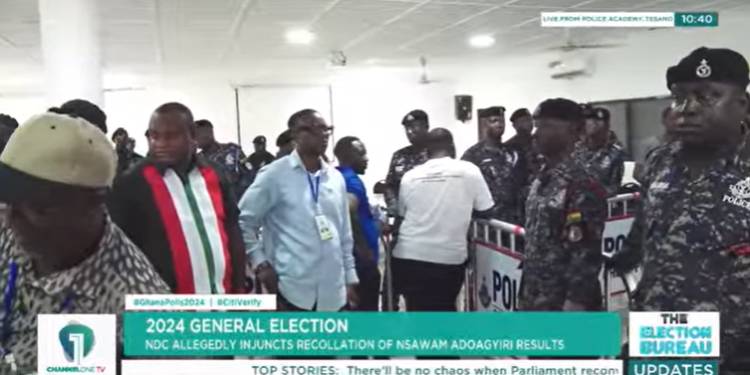The National Democratic Congress (NDC) has reportedly secured a court injunction to halt the Electoral Commission's (EC) ongoing re-collation of parliamentary election results for the Nsawam-Adoagyiri constituency. This legal intervention comes amidst growing tension and allegations of irregularities surrounding the disputed results, sparking fierce debates between the NDC and the New Patriotic Party (NPP).
The injunction aims to pause the EC’s re-collation process, which began as part of a broader initiative to resolve disputes in four key constituencies in the Eastern Region—Suhum, Nsawam, Fanteakwa North, and Akwatia. These areas have been at the center of controversy due to discrepancies in the collation of votes from the December elections. The re-collation process, held at the National Police Training School in Tesano, Accra, was intended to address these contentious issues and ensure transparency.
However, the re-collation, which commenced on December 12, quickly became fraught with disagreements. Tensions between the NDC and the NPP escalated, resulting in delays and confusion that extended the process into a second day. According to sources, the NDC raised serious concerns about inconsistencies in the EC’s original pink sheets—the official documents used to collate election results. These discrepancies have further fueled the party’s claims that the initial collation was flawed and necessitated legal intervention.
The court injunction filed by the NDC has effectively brought the re-collation process to a standstill. The party argues that continuing with the re-collation under the current circumstances could undermine the integrity of the election results. By halting the process, the NDC seeks to ensure that the EC addresses all outstanding concerns before moving forward.
For its part, the Electoral Commission has maintained that the re-collation was a necessary step to resolve disputes and restore confidence in the electoral process. The decision to re-collate results in these constituencies was made following a directive from the EC, which cited complaints from both political parties regarding the original collation process.
The NDC’s legal action underscores the high stakes involved in the parliamentary elections for Nsawam-Adoagyiri and the other disputed constituencies. The constituency has been a stronghold for the NPP, and any shift in the results could have significant implications for the party's parliamentary majority.
In response to the court injunction, NPP officials have criticized the NDC’s actions, accusing the party of attempting to delay the electoral process and disrupt efforts to resolve the disputes amicably. The NPP maintains that the EC’s re-collation process was a transparent and legitimate attempt to address concerns raised by both parties and ensure a fair outcome.
Observers have expressed concern over the escalating tensions between the NDC and NPP, warning that the disputes could undermine public confidence in Ghana’s electoral system. The re-collation process, while intended to promote transparency, has instead become a flashpoint for partisan conflict, with both parties accusing each other of undermining democratic principles.
The legal battle over the Nsawam-Adoagyiri constituency is likely to have broader implications for the resolution of disputes in the other three constituencies under review. As the court considers the NDC’s injunction, the outcome could set a precedent for how similar disputes are handled in the future.
Beyond the immediate legal and political ramifications, the situation highlights the critical importance of robust electoral systems and transparent processes in upholding democracy. The controversy over the re-collation underscores the need for electoral reforms to address gaps in the system and prevent similar disputes in future elections.
For now, the focus remains on the court’s decision regarding the NDC’s injunction and the next steps for the Electoral Commission. As both parties prepare for the legal battle ahead, Ghanaians are watching closely, hopeful for a resolution that upholds the integrity of the nation’s democratic process.
This development is part of a broader narrative surrounding Ghana’s 2024 elections, which have been marked by intense competition and heightened political tensions. The outcome of these disputes will not only shape the immediate political landscape but also set the tone for how Ghana navigates electoral challenges in the years to come.
As the dust settles on the election season, it is clear that the journey toward a conclusive and peaceful resolution remains fraught with challenges. The stakes are high, and the actions of political parties, the Electoral Commission, and the judiciary will play a pivotal role in determining the path forward.




No comments yet
Be the first to share your thoughts!